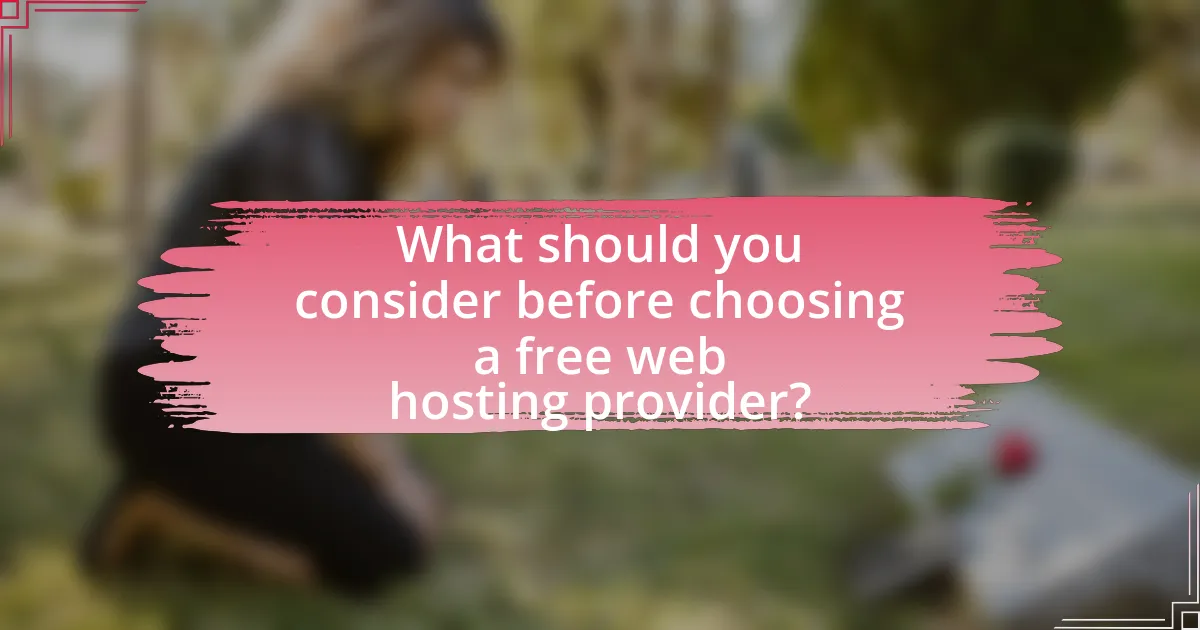Free web hosting is a cost-effective service that allows individuals and organizations to host websites without financial investment, though it typically comes with limitations such as restricted storage, bandwidth, and customer support. This guide outlines the differences between free and paid hosting options, the advantages and disadvantages of free hosting, and essential considerations for selecting a provider. Key topics include the importance of uptime and server speed, security measures, common pitfalls, and best practices for creating and optimizing content on free hosted sites. Additionally, it provides practical steps for getting started with free web hosting and troubleshooting common issues.

What is Free Web Hosting?
Free web hosting is a service that allows individuals or organizations to host their websites on the internet without incurring any costs. This type of hosting typically offers limited resources, such as storage space and bandwidth, compared to paid hosting services. Many free web hosting providers monetize their services through advertisements displayed on users’ websites or by offering premium features for a fee. According to a report by HostingAdvice, free web hosting can be a viable option for personal projects or small websites, but it often comes with restrictions that may not suit larger or commercial ventures.
How does free web hosting differ from paid options?
Free web hosting differs from paid options primarily in terms of features, reliability, and support. Free web hosting typically offers limited storage, bandwidth, and functionality, often including advertisements on the hosted site, while paid hosting provides more resources, enhanced performance, and customer support. For example, paid hosting services often guarantee uptime percentages above 99.9%, whereas free hosting may not offer such reliability, leading to potential downtime. Additionally, paid options usually include domain registration and professional email accounts, which are often absent in free hosting plans.
What are the limitations of free web hosting services?
Free web hosting services have several limitations, including restricted storage space, limited bandwidth, and lack of customer support. These services often impose caps on the amount of data that can be stored and transferred, which can hinder website performance and accessibility. Additionally, free hosting typically includes advertisements on users’ sites, which can detract from the user experience and brand image. Security features are often minimal, leaving websites vulnerable to attacks. Furthermore, users may not have access to essential tools and functionalities, such as custom domain names or advanced analytics, which are crucial for professional online presence.
What features are typically included in free web hosting?
Free web hosting typically includes features such as limited storage space, bandwidth restrictions, and subdomain usage. These services often provide basic website builders and templates, allowing users to create simple websites without coding knowledge. Additionally, free web hosting may include advertisements displayed on the hosted site, which can affect user experience. Security features are usually minimal, and customer support is often limited compared to paid hosting options.
Why would someone choose free web hosting?
Someone would choose free web hosting primarily to minimize costs while establishing an online presence. Free web hosting services allow individuals and small businesses to create websites without financial investment, making it accessible for those with limited budgets. According to a survey by HostingAdvice, approximately 70% of new website owners opt for free hosting to test ideas or learn web development before committing to paid services. This approach enables users to evaluate features and functionalities without financial risk, facilitating experimentation and learning in the digital space.
What are the advantages of using free web hosting for beginners?
Free web hosting offers several advantages for beginners, primarily cost-effectiveness and ease of use. Beginners can start building their online presence without financial investment, allowing them to experiment and learn without the pressure of expenses. Additionally, many free web hosting services provide user-friendly interfaces and templates, simplifying the website creation process for those with limited technical skills. According to a survey by HostingAdvice, 70% of new website owners prefer free hosting options to test their ideas before committing to paid services, highlighting the practicality of free hosting for novices.
How can free web hosting benefit small businesses or personal projects?
Free web hosting can significantly benefit small businesses or personal projects by providing a cost-effective platform to establish an online presence. This allows entrepreneurs and individuals to save on initial expenses, which is crucial for startups and personal endeavors with limited budgets. According to a survey by Clutch, 30% of small businesses reported that cost is a primary factor when choosing a web hosting service. Additionally, free web hosting often includes essential features such as website builders and templates, enabling users to create and manage their sites without technical expertise. This accessibility fosters creativity and innovation, allowing small businesses and personal projects to focus on growth and engagement rather than technical hurdles.

What should you consider before choosing a free web hosting provider?
Before choosing a free web hosting provider, you should consider the limitations on storage and bandwidth. Many free hosting services impose strict caps on these resources, which can hinder your website’s performance and scalability. For instance, providers like InfinityFree offer unlimited bandwidth but may restrict storage to a few gigabytes, impacting larger sites. Additionally, evaluate the level of customer support available, as free services often provide limited assistance, which can be problematic if technical issues arise. Security features are also crucial; some free hosts lack essential protections, making your site vulnerable to attacks. Lastly, consider the presence of ads on your site, as many free hosting providers display their advertisements, which can detract from your brand’s professionalism.
What factors influence the reliability of free web hosting services?
The reliability of free web hosting services is influenced by several key factors, including server uptime, customer support, resource limitations, and security measures. Server uptime is critical, as many free hosting providers offer limited guarantees, often resulting in frequent downtimes; for instance, a provider may only guarantee 99% uptime, which translates to over 7 hours of potential downtime each month. Customer support is another significant factor; free services typically offer minimal or no support, making it difficult for users to resolve issues promptly. Resource limitations, such as bandwidth and storage, can also affect reliability, as exceeding these limits may lead to service interruptions. Lastly, security measures are crucial; many free hosting services lack robust security protocols, making websites vulnerable to attacks, which can compromise reliability.
How important is uptime and server speed in free web hosting?
Uptime and server speed are critically important in free web hosting. High uptime ensures that a website is accessible to users consistently, while fast server speed affects how quickly content loads, impacting user experience and search engine rankings. Research indicates that websites with a loading time of under three seconds have a significantly lower bounce rate, with 40% of users abandoning a site that takes longer to load. Additionally, a study by Google found that a one-second delay in mobile load times can reduce conversions by up to 20%. Therefore, reliable uptime and optimal server speed are essential for maintaining user engagement and achieving online success in free web hosting.
What security measures should you look for in free web hosting?
When evaluating free web hosting, you should look for security measures such as SSL certificates, regular backups, and malware scanning. SSL certificates encrypt data transmitted between the user and the server, ensuring secure connections. Regular backups protect your data from loss due to server failures or attacks, while malware scanning helps identify and mitigate potential threats. These features are essential for maintaining the integrity and safety of your website, as they reduce the risk of data breaches and enhance overall security.
What are the common pitfalls of free web hosting?
Common pitfalls of free web hosting include limited storage and bandwidth, lack of customer support, and the presence of ads on hosted sites. Limited storage and bandwidth can restrict website growth and performance, making it difficult for users to manage traffic effectively. The absence of reliable customer support can lead to unresolved technical issues, impacting website uptime and user experience. Additionally, many free hosting services display ads on users’ websites, which can detract from the site’s professionalism and user engagement. These factors collectively hinder the effectiveness and reliability of free web hosting solutions.
How can ads affect your website’s performance and user experience?
Ads can negatively impact your website’s performance and user experience by increasing load times and causing distractions. When ads are present, they can slow down page loading speeds, as each ad requires additional resources to load, which can lead to higher bounce rates; studies show that a one-second delay in loading time can reduce conversions by 7%. Furthermore, intrusive ads can disrupt the user experience, making navigation difficult and frustrating, which can lead to decreased user engagement and satisfaction. Research indicates that 70% of users find ads annoying, which can result in users leaving the site altogether.
What are the risks of data loss or limited support with free hosting?
Free hosting services pose significant risks of data loss and limited support due to their lack of robust infrastructure and resources. Many free hosting providers do not offer regular backups, which increases the likelihood of losing data in case of server failures or technical issues. Additionally, these services often have minimal customer support, leading to prolonged downtime and unresolved technical problems. According to a study by HostingAdvice, 70% of free hosting users reported experiencing data loss at least once, highlighting the inherent risks associated with such platforms.

How can you get started with free web hosting?
To get started with free web hosting, choose a reputable free web hosting provider such as InfinityFree, 000webhost, or AwardSpace. These platforms typically require you to sign up for an account, which involves providing an email address and creating a password. After registration, you can create a new website by selecting a domain name, which may be a subdomain provided by the host, and then use their website builder or upload your own files via FTP. Many free hosting services offer limited storage and bandwidth, making them suitable for small projects or personal websites.
What steps should you follow to set up a free website?
To set up a free website, follow these steps: first, choose a free website builder or hosting platform such as WordPress.com, Wix, or Weebly. Next, create an account on the selected platform by providing your email and setting a password. After account creation, select a template or theme that suits your website’s purpose. Then, customize the template by adding your content, images, and any necessary features. Finally, publish your website by clicking the publish button, making it accessible to the public. These platforms typically offer user-friendly interfaces and templates, making it easy for beginners to create a website without coding knowledge.
How do you choose the right platform for your free web hosting?
To choose the right platform for free web hosting, evaluate the platform’s features, reliability, and user support. Key features to consider include storage space, bandwidth limits, and ease of use, as these directly impact your website’s performance and management. Reliability is crucial; platforms with high uptime percentages, ideally above 99%, ensure your site remains accessible. Additionally, user support options, such as forums, live chat, or email assistance, can significantly enhance your experience, especially for beginners. Researching user reviews and comparisons can provide insights into the strengths and weaknesses of various platforms, helping you make an informed decision.
What are the best practices for creating content on a free hosted site?
The best practices for creating content on a free hosted site include focusing on quality, optimizing for SEO, and ensuring mobile responsiveness. Quality content engages users and encourages sharing, which is crucial for building an audience. Optimizing for SEO involves using relevant keywords, meta tags, and alt text for images to improve visibility in search engines. Ensuring mobile responsiveness is essential, as over 50% of web traffic comes from mobile devices, according to Statista. By adhering to these practices, content creators can maximize the effectiveness of their free hosted sites.
What tools and resources can help you succeed with free web hosting?
To succeed with free web hosting, essential tools and resources include website builders, content management systems (CMS), and online tutorials. Website builders like Wix and Weebly provide user-friendly interfaces for creating websites without coding knowledge. Content management systems such as WordPress offer extensive themes and plugins, enabling customization and functionality. Online tutorials and forums, like those found on YouTube or Stack Overflow, provide guidance and troubleshooting support, enhancing the learning experience for beginners. These resources collectively empower users to effectively utilize free web hosting services and create functional websites.
Which website builders are compatible with free web hosting?
Website builders compatible with free web hosting include WordPress.com, Wix, Weebly, and Jimdo. These platforms allow users to create websites without incurring hosting fees, making them accessible for beginners. For instance, WordPress.com offers a free plan that includes hosting, while Wix provides a free tier with hosting and a drag-and-drop interface. Weebly also features a free plan with hosting capabilities, and Jimdo allows users to build websites at no cost with included hosting.
How can you optimize your site for better performance on free hosting?
To optimize your site for better performance on free hosting, focus on minimizing file sizes and reducing server requests. Compress images and use formats like WebP to decrease load times, as studies show that optimized images can reduce page load time by up to 80%. Additionally, implement caching strategies to store frequently accessed data, which can significantly enhance loading speed. Using a Content Delivery Network (CDN) can also distribute content more efficiently, improving access speed for users across different geographical locations. These methods collectively contribute to a more responsive and faster website experience on free hosting platforms.
What are some tips for troubleshooting common issues in free web hosting?
To troubleshoot common issues in free web hosting, first check the hosting provider’s status page for any outages or maintenance notifications. Many free hosting services experience downtime, which can affect website accessibility. Next, verify your domain settings to ensure they are correctly pointed to the hosting server, as misconfigured DNS settings can lead to site inaccessibility. Additionally, review your website’s error logs, if available, to identify specific issues such as broken scripts or database connection errors. Lastly, consider reaching out to the hosting provider’s support forums or community for assistance, as many users share solutions to similar problems. These steps are effective because they address the most frequent causes of issues in free web hosting environments.















